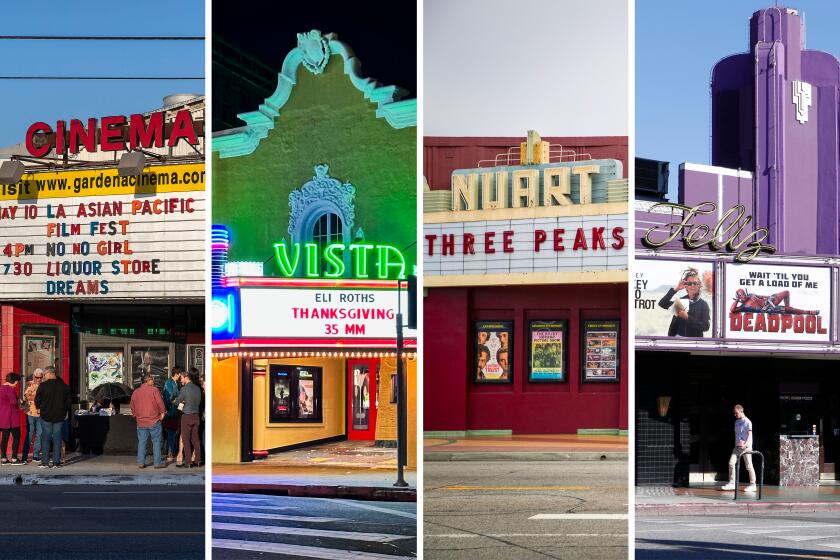
- Share via
Late in Italian writer-director Giovanni Tortorici’s pop-up book of a coming-of-age movie “Diciannove” (Nineteen), there’s a great scene in which his arrogant, neurotic protagonist, Leonardo (Manfredi Marini), a student of classical Italian literature in Siena, is visiting a cousin (Zackari Delmas) attending university in Milan. As the two commiserate over crazy adventures, the chatter turns to disagreements and griping (culture, language, kids today, drugs aren’t fun anymore) and suddenly they sound like middle-aged men bemoaning why anything ever had to change.
The cusp of 20 is a laughably unformed time to be convinced of anything, but what Tortorici’s higgledy-piggledy debut feature makes breathlessly clear is that when you’re in the middle of it, youth is a candy-colored tornado of temptations and responsibilities. You’re the star of your own solipsistic, hallucinatory epic, even if what you imagine for yourself might be a straightforward affair with a clear-cut message about the meaning of life.
“Diciannove” hums with the dissonance of repression plus expression in Leonardo’s consequential 19th year. If you notice a similarity to the playful moods and textures of Tortorici’s countryman Luca Guadagnino, there’s a reason: The “Call Me by Your Name” filmmaker produced his protégé Tortorici’s autobiographical debut feature and a lineage of tenderness and vivacity in evoking the emotional waves of adolescence is more than evident.
We meet Leonardo as a nosebleed-suffering, dreamy-eyed Palermo teen with a haranguing mom. He’s headed to business school in London, where his older sister Arianna (Vittoria Planeta) also lives. But once there, after a round of hard-partying with her friends and the sense that he’s replaced one hypercritical family member for another, he makes a last-minute decision to change the course of his educational life and enroll as a literature student back in Italy.
We’ve mapped out 27 of the best movie theaters in L.A., from the TCL Chinese and the New Beverly to the Alamo Drafthouse and which AMC reigns in Burbank.
Cut to picturesque Siena and cue the baroque score. In this ancient Tuscan city, Leonardo is awakened by his writerly ambitions, a swoony love for medieval Italian authors like Dante and an intellectual disdain for the 20th century. But it also turns him into a lonely, rigidly neoclassicist oddball who scorns his professors, prefers books to his flighty peers and still can’t seem to take care of himself. Sealing himself off in a stuffy, antiquated notion of personal morality only makes the trappings of real life (desire, depression, cleanliness, online enticements) harder to deal with, leading his journey of self-discovery to some internally and externally messy places.
And some messy filmmaking too, even if that’s the point of this elegantly shapeless headspace travelogue. With unapologetic brio, Tortorici, cinematographer Massimiliano Kuveiller and editor Marco Costa empty out their tool kit of angles, splits, tracks, smudges, zooms, smashes, jumps, needle drops, montages and text cards. Though never disorienting or obnoxious (à la “Euphoria”), it can get tiring: a restlessness of spirit and technique that occasionally separates us from this lost antihero when we crave a closer connection to him. Especially since first-time actor Marini is stellar casting. There’s an easygoing inscrutability to his demeanor and his sad, mischievous eyes compel our curiosity — he’ll never let you think you’ve watched a thousand coming-of-age movies.
Tortorici doesn’t give his searcher a tidy ending. There’s a hilarious psychoanalysis by a wealthy aesthete (Sergio Benvenuto) who sees right through his posturing. But the night air beckons. As Leonardo walks away from us at the end after serving up a rascally smile (in a very “400 Blows”-ish freeze frame), Tortorici has him stumble briefly on the cobblestones, and somehow it feels like the wit of “Diciannove” in a split second of screen time: Youth means missteps, so why dwell on them?
'Diciannove'
In Italian, with subtitles
Not rated
Running time: 1 hour, 48 minutes
Playing: Opens Friday, July 25 at Laemmle Monica, Laemmle Glendale
More to Read
Only good movies
Get the Indie Focus newsletter, Mark Olsen's weekly guide to the world of cinema.
You may occasionally receive promotional content from the Los Angeles Times.











